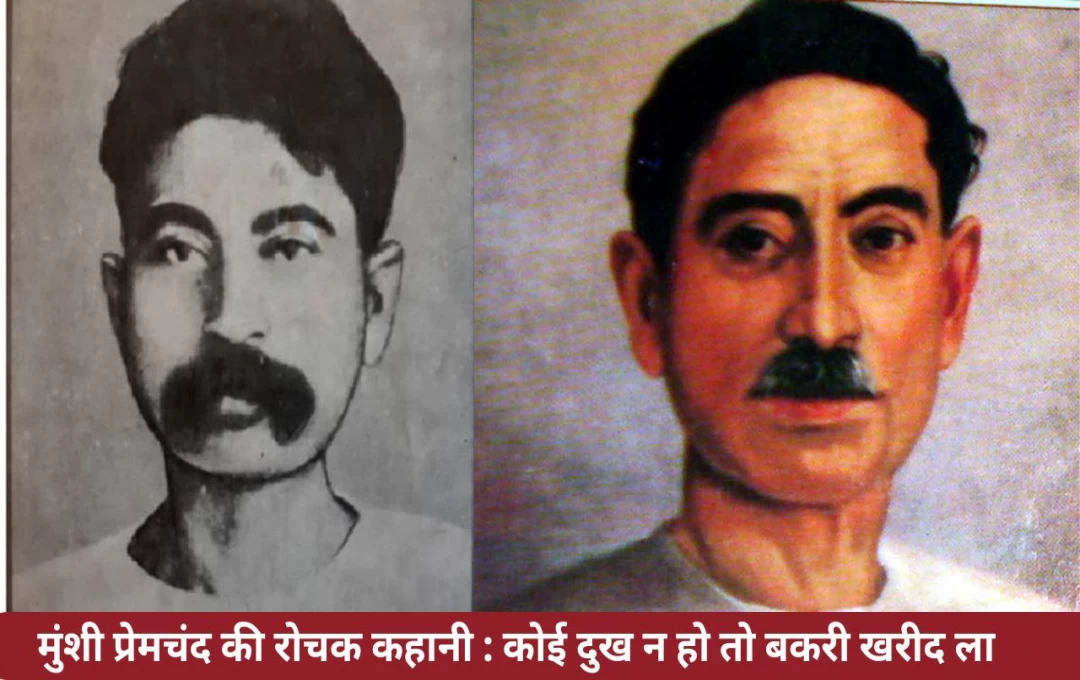Friends, our nation has been a cradle of great men and women, brimming with sages, poets, writers, musicians, and many more, for centuries. Countless invaluable literary works created by these luminaries are a treasure trove. Today's youth, in this digital age, seem lost, moving further away from our heritage and invaluable treasures. Subkuz.com consistently strives to bring you not only these precious gems but also engaging stories, news, and information from around the world. Presented before you is a truly inspiring story, penned by the renowned writer, Munshi Premchand.
Buy a Goat if You Want to Avoid Trouble
Those days, milk was a constant problem. I tried various dairy farms, examined their processes, but nothing worked. For a couple of days, the milk would be good, then adulteration would begin. Sometimes, the milk would curdle, sometimes it would have an unpleasant smell, sometimes the butter would separate improperly. Finally, I said to a friend, "Come, let's buy a cow together. You'll get relief from milk troubles, and so will I. We'll share the cost, and the milk." My friend agreed. My home lacked space, and I disliked the mess of cow dung. He had plenty of room, so we agreed the cow would stay at his place. In exchange, he would have exclusive rights to the cow dung; he could use it as he wished, for making bricks, plastering his house, or giving it away to neighbors, or even employing it in Ayurvedic practices. No objections were raised, and the agreement was made with clarity and intent, promising that he would never claim rights over the dung, nor would he force the matter upon anyone else.
The milk supply started, and the daily hassles ended. For a week, there were no complaints. I would drink the warm milk, singing with joy:
Praise be to God, brother, for the cow he has given us.
Fresh milk, a taste of life's delights, he has bestowed.
Bread dipped in milk, a blessing of his grace, he has granted.
What a simple, lovely form of divine mercy.
But gradually, old problems resurfaced. The milk eventually became nothing more than milk in name. No matter how much I boiled it, there was no trace of cream or sweetness. At first, I would complain, and this helped relieve my anxieties. If complaints didn't improve matters, I would stop buying the milk. Now there was no longer even an opportunity to complain; the idea of stopping was out of the question. A beggar's anger is on his own life; drink it or pour it into the drain. Eight annas worth of daily milk was destined. The child wouldn't even put the milk to his mouth, let alone drink it. I gave them milk with a few drops of sugar for a while, but boils started appearing on the children, and my home was in constant uproar. My wife would order the servant, "Take the milk and throw it on their heads." I would plead with the servant. She would retort, "Your friends are so inconsiderate; they don't feel ashamed. Are they so thoughtless that they don't understand how others will perceive their milk?" "Get the cow to your house; at least there won't be any smell or flies, and the milk will be good. If there are costs involved, the benefits will follow."
Mr. Chadda was an old friend, and very informal. This act of indiscretion would have been hard to digest, even if it had been done behind closed doors. Was it his wife's mischief, or the servant's? How could I complain? Moreover, I had to maintain propriety with his wife. She had been to my house several times. My wife had also visited his home. Could they have been so foolish as to play such tricks? I found it impossible to complain about the milk to them, whatever the cause. Fortunately, Mr. Chadda transferred in the third month. I couldn't manage the cow on my own. The partnership ended, and the cow was sold for half the price. I heaved a sigh of relief that day.
The solution was to get a goat. It could be kept in a corner of the courtyard. It needed no herdsman, no one to carry away its dung, to wash the troughs, or to feed it. Even my servant could easily milk it. A little bran was added, and the matter was settled. Goat's milk was also considered beneficial, especially for children. It is easily digestible and neither causes heat nor cold. It is good for health. Fortunately, the pundit who used to come to my house to copy my documents had considerable experience in such matters. I discussed it with him, and he sang such praises of the goat, describing it in such glowing terms, that I became enamored of it before even seeing it. It's a sturdy breed, tall, with large udders that seemed to touch the ground. Very frugal, but a very good milker. You can get two to two and a half seers of milk at a time. It is its first lactation. It would cost twenty-five rupees. Though the price seemed a bit high, I trusted the pundit. I placed my order, and the goat arrived three days later. I jumped with joy when I saw it. It exceeded the described qualities. A small clay milk trough was ordered, and the bran was procured. In the evening, my servant milked it, and true enough, it yielded two and a half seers. My small pot was overflowing. This matter, after so many days, had finally been resolved. If I had thought of this earlier, I would have avoided so much trouble. I thanked the pundit profusely. I had to hold its horns early in the morning and in the evening to get it milked. But this inconvenience was nothing compared to the milk.
``` (The remaining content will be provided in subsequent sections, as it exceeds the token limit)